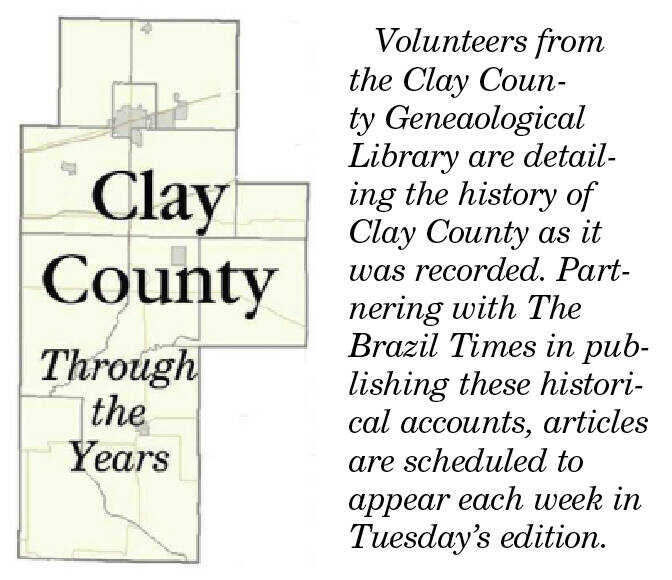TOP STORY OF THE DAY: CLAY COUNTY THROUGH THE YEARS: Broom Making

The raising of broom corn for making brooms was very common among the early inhabitants. The manufacture of brooms was a very important necessity. In the absence of a real broom-maker, the women made some kind of sweepers for their use. A broom-maker of much skill had employment among the neighbors for quite a distance from his place. A blind man by the name of Smith lived at the corner of the Billtown and Staunton Road and engaged in the manufacture of brooms for the people of the vicinity.
He was very skillful and enjoyed an excellent patronage.
The broom handles were made from some of the native wood either by the broom-maker or some skilled wood workman. After the stores had brooms for sale, the old plan of producing sweepers was still very much in evidence.

In August 1887, Edward Buchanan of Harmony, was an industrious blind boy. He went to work at the trade of broom-making at a factory in Boone County. He learned his trade at the school for the blind.
The well-known broom-maker, was August Blessing, better known as “Gus,” who had been an inmate of the county poor farm because of his loss of his sight, which was destroyed in a mine explosion. He had been born in Germany and educated in a technical university near Berlin. He had been an expert machinist. He came to America at twenty-one years of age to seek his fortune and finally located at Staunton, where he was employed in the coal mines as a machinist.
He later went to work at a mine in Belleville, Illinois, where he narrowly escaped being killed by the premature explosion of a shot. His sight was destroyed. He was sent to the Clay County infirmary to live. His idleness due to his affliction was hard for him to bear. He persuaded the authorities to send him to the blind school at Indianapolis, that he might learn a trade of some kind. There he became a broom maker and had worked at this trade at the county infirmary to support himself as he did not like being classed a pauper. Mr. Blessing was allowed a commission on all brooms that he made, and this money he carefully hoarded to pay for his funeral as he did not want to die a pauper. He had made his arrangements with C.O. Rentschler & Co. before his passing.

The present generation of house-keepers can hardly realize the difficulties encountered by the pioneer women in keeping their cabins clean. Of course, there were no walks for protecting the houses from accumulation of dirt. Men and children were generally accustomed to cleaning their feet before entering the dwellings. The summer times presented less troubles, for the children went barefoot, and in many instances their fathers and mothers wore shoes or boots on Sundays and special occasions only.
The difficulty of providing some kind of brooms for sweeping the puncheon floors presented a problem for the ingenuity of the Clay County women. No brooms were for sale in the small stores. Necessity is said to be the mother of inventions. Many of the men were experts in making scrub brooms from little hickory or oak saplings. Levi Wells was the most noted maker of scrub brooms in the north end of the county.
Submitted by Rhonda Tincher, Clay County Genealogy Society, Center Point, Indiana
Sources: Brazil Clay County Enterprise, August 24, 1887; Brazil Daily Times, May 11, 1926; December 20, 1929.
